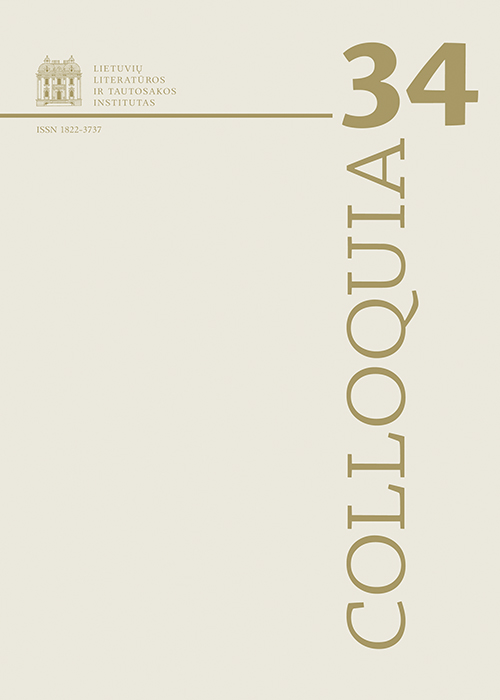Minority Writing as a Challenge to the National Literary Canon: The Case of Lithuania
Abstract
This article investigates the question of literary canon formation in presentday Lithuania from the perspective of minority writing and in the context of Western canon theory. The author focuses on debates around literary canon that were stimulated by the ideology of liberal pluralism, and which took place in American academia and public discourse during the 1970s and 1980s; these debates are reflected in publications by Cornell West, John Guillory, and Mikhail Gronas, and are useful in demonstrating the peculiarities of the Lithuanian context.
The first peculiarity is the specific history of the minority-majority relationship. In Lithuania, the largest minorities are Poles and Russians, who are perceived in the national historical narrative as former colonizers (primarily Russians, but also Poles, who controlled Vilnius during the inter-war period). The second is the fact that the literary traditions of the languages spoken by these minorities have greater cultural capital in “the World Republic of Letters” than does the Lithuanian literary tradition. In Lithuania, minority literatures are mostly written in minority languages, and this creates additional obstacles for including them in the national literary canon. The third peculiarity is the isolated existence of minority writing and its criticism in Lithuania – it stays within academia, thereby producing no effect on public discourse.
The article concludes that in Lithuania, for the time being, minority discourses and the canon debate do not intersect in any significant way. Lithuanian society has not yet developed the need for multicultural selfreflexivity. The crisis of the literary canon here is mostly seen as a byproduct of de-Sovietization, but also – and here the situations in Lithuania and Western countries are similar – of the devaluation of literature as a form of cultural capital.
Downloads
Most read articles by the same author(s)
- Jurga Sadauskienė, A New Ethnomusicological Monograph: On Tradition in a Contemporary Way, On Community in a Global Way, and On Amateurism in a Professional Way , Colloquia: Vol. 45 (2020)
- Birutė Avižinienė, Literature and Its Authors in the Interwar Lithuanian Radio Programs , Colloquia: Vol. 46 (2021)
- Jochen Schimmang, The Tense Muscles of a Fanatic (Antanas Škėma, The White Shroud) , Colloquia: Vol. 38 (2017)
- Inga Mitunevičiūtė, The Ecological Potential of Vytautas Petkevičius’s Didysis medžiotojas Mikas Pupkus (The Great Hunter Mikas Pupkus) , Colloquia: Vol. 35 (2015)
- Rita Tūtlytė, An Attempt to Reconstruct the Generation of Žemininkai: Benediktas Labėnas , Colloquia: Vol. 49 (2022)
- Dalia Jakaitė, Openness of Existential Temporal Experiences to (Non)Being: The Poetry of Vaidotas Daunys and Valdas Gedgaudas , Colloquia: Vol. 36 (2016)
- Violeta Kelertas, A discussion on methodology for researching soviet literary space (Concluding discussion of the conference “Literary Field Under the Communist Regime: Structure, Functions, Illusio,” October 7–9, 2015. , Colloquia: Vol. 35 (2015)
- Gitana Vanagaitė, Uncles and Aunts by Vaižgantas in Literary History, Cinema and Theatre , Colloquia: Vol. 41 (2018)
- Akvilė Šimėnienė, Feminist Phenomenology in the Criticism of Birutė Ciplijauskaitė , Colloquia: Vol. 38 (2017)
- Giedrė Šmitienė, “I Smile Too When I Think of You”: The Beginning of the Friendship between Bronė Jacevičiūtė-Jėčiūtė and Janina Degutytė. Intermedial Source and Initial Research of the Relationship , Colloquia: Vol. 52 (2023): Colloquia




